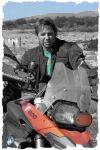ABS and front brakes
Maybe someone can help me get an answer for this. A guy riding a BMW K1200S recently mentioned in a conversation that his life was saved in an accident because of the following reason. Because the bike has ABS, it means that when you pull the front brake, the back brake automatically kicks in as well, preventing the bike from nose diving. Had he went head-down he would've knocked the other car with his head, instead his body was more upright and this probably saved his life.
My question is on the brakes and not whether his posture saved his life or not. Is it true that the back brake automatically kicks in when one pulls only the front (with ABS on of course)? Also, I have tried front, back and both together, and when I pull my front the bike dives much more than when I do the back or both together. He also claimed that he saves on brake disks now the he is only using the front brakes, because of the fact that both brakes at the same time. I basically started off using only the front, but now plays whith them depending on where I find myself, corner, wet tar, different speeds...etc. So, do they brake together when you only pull the front, and which is the best way to brake?
Some bikes have the brakes coupled such that when you use the front brake only it also pulls the back. I suspect that is only for servo-assisted brakes and only on some models. I'm sure BMW has a fancy acronym for that.
ABS is a different matter. With ABS the system detects when the wheel locks and releases the brake slightly to prevent you from skidding during hard braking.
You should get into the habit of always using both brakes. During hard braking, for the first little bit both tyres contribute fairly equally to the stopping power, but as the weight of the bike shifts forward (and you get flung onto the tank with your nuts), the front wheel has much more traction and the back tends to lift off the ground, the front has all the stopping power and all the traction.
Of course, if you grab the front too early in the sequence and try too hard you will lose traction on front and fall (that is where ABS is very helpful). So emergency braking involves hard braking at the back and a controlled slow squeeze of the front until you are eventually applying almost full force on the front brake.
HTH
I can only talk about my integral ABS on my old R1150R. When you pull the front brake, it automatically activates the rear brake as well, but not fully. It also checks the movement of both wheels. The main aim is not to abruptly jam a wheel to a standstill, because that is dangerous. You can pull the front brake full in an emergency and the bike will not loose the front end.
The rear brake (on my bike at least) is not linked to the front brake.
In general I must say that ABS is fantastic. There are unfortunately also some situations on tar where it does just the opposite of what you want. If you for instance approach a red traffic light on an extremely bumpy surface where the wheel looses ground contact even for milliseconds, the ABS will release the brake and you feel like accelerating instead of braking. That's when you need the independent rear brake. We have some intersections where the tar melted and is pushed up to little humps by braking cars. Very bad for ABS.
"...on an extremely bumpy surface where the wheel looses ground contact even for milliseconds, the ABS will release the brake and you feel like accelerating instead of braking."
Thanks Charles.
I might be drifting off the topic now, but back to what wolf has mentioned. I have experienced that sometimes when I brake it feels like my back brake is slipping. I even feel the vibration in my foot on the brake lever. I usually then release the back brake and apply it again. Does it mean that my ABS might be faulty, or is this because of the back wheel may be "loosing ground contact?"
I even feel the vibration in my foot on the brake lever. I usually then release the back brake and apply it again.
you could always check if you have any pads left and you're not grinding away metal on metal ... that vibrates! <ha ha only kidding!>
ABS has that shuddering feel as the system releases and reapplies the brake. It is normal. What is not normal is that you are provoking the ABS to apply. The California Highway Patrol guys have to file an incident report every time their ABS is fired.
Optimum braking is just before ABS kicks in (cos when it kicks in you lose braking altogether for a split second). That is why a skilled rider can outbrake ABS.
The skipping thing that Wolf describes also happens (but worse) on gravel, which is why you absolutely must turn off ABS when riding off-road. It is so bad on gravel that sometimes it feels like your brakes have failed completely.
Manie, I think Charles is right and I assume that you are not using your ABS off road. Please keep in mind that the front brake is your main brake and your rear brake is only used when there is a critical situation like sand or water on the road. I use it only to stabilise the bike in a corner if I misjudged the speed or the actual corner. I hardly ever use the rear brake. Try to use the front brake more and only touch the rear one when it is really needed. The front brake is much more efficient because the weight is towards the stopping wheel and not pulling away from it like it is with the rear wheel. All this of course only applies for tar roads.
If understood correctly, on the 2008 G S 1200 the rear brake can be applied independently of the front whereas applying the front brake only activates the rear as well. It is interesting to note the different interpretations of applying the rear brake. I always apply the rear first then the front, tar or gravel, as described by Charles. Whatever floats your boat.




